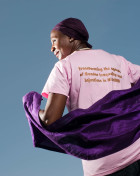I live in Lagos, Nigeria where I work with Alliances for Africa as a Program Assistant and the Nigerian Feminist Forum (NFF) Secretariat. As a program assistant and the NFF Secretariat my duties are to support planning and implementation of programmes for the organization and the NFF. I also support outreach, training, and networking to ensure that we achieve our objectives. In addition, I play a central role in media relations, proposal writing and also documentation of the NFF.
I call myself a feminist because I oppose in words and in deeds all forms of patriarchal oppression. The lives of women and girls do not seem to mean as much as the lives of men and boys. We are poorer, more vulnerable, less educated, bartered, raped and beaten. I also believe in the global struggle for women’s rights and liberation.
In my own view, the challenges feminists in Africa face today have to do with religious fundamentalisms. Especially in Nigeria, religion has taken a different scope as it affects the way most women see themselves and also the freedoms that women are allowed. Another challenge is the misconception of who is a feminist and what is feminism. Most women are feminist based on the passion they have in advancing women but they refuse to be seen as feminist because of the stigma attached to feminists, sometimes because of the violence targeted at feminists, and most often because they are afraid to claim it as an identify for fear of being perceived as too confrontational.
We can address these challenges through engaging more and more younger women, by convening spaces big and small for them to increase their knowledge on feminism as well as movement-building initiatives. We also need to institutionalise feminist principles in our day to day activities as wives, mothers, mentors, leaders. Finally, we need to tell our own stories, and publicise our achievements, successes in many different spaces, including the media.
In my personal life I have addressed these challenge by always saying that I am a feminist. I preach it and I show it wherever the need arises and I even speak out when it is difficult to. In my professional life I have tried to address these challenges by actively opposing all forms of patriarchal and oppression. I engage in advancing the life of women by promoting and advocating for women’s rights struggle and liberation in Nigeria.
I get inspired when I put a smile on the face of a confused women struggling between cultural norms and her real world. I get inspired when I have control over my space, I get inspired when a woman is in control of affairs concerning women, I get inspired when laws are enacted to protect the rights of women, and I get inspired when women are happy.



